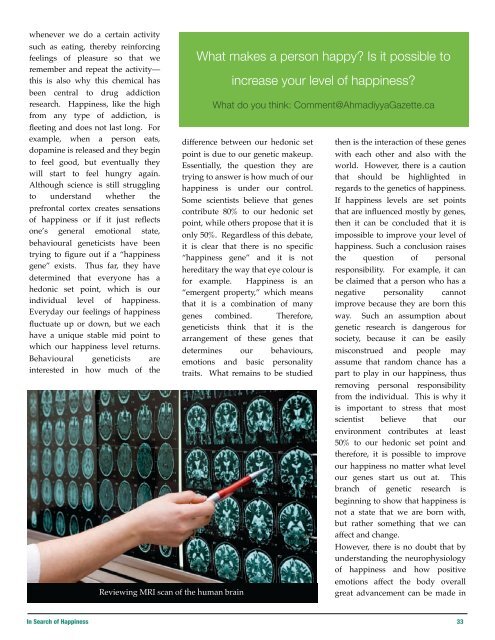Ahmadiyya Gazette Canada
Ahmadiyya Gazette Canada
Ahmadiyya Gazette Canada
You also want an ePaper? Increase the reach of your titles
YUMPU automatically turns print PDFs into web optimized ePapers that Google loves.
whenever we do a certain activity<br />
such as eating, thereby reinforcing<br />
feelings of pleasure so that we<br />
remember and repeat the activity—<br />
this is also why this chemical has<br />
been central to drug addiction<br />
research. Happiness, like the high<br />
from any type of addiction, is<br />
fleeting and does not last long. For<br />
example, when a person eats,<br />
dopamine is released and they begin<br />
to feel good, but eventually they<br />
will start to feel hungry again.<br />
Although science is still struggling<br />
to understand whether the<br />
prefrontal cortex creates sensations<br />
of happiness or if it just reflects<br />
one’s general emotional state,<br />
behavioural geneticists have been<br />
trying to figure out if a “happiness<br />
gene” exists. Thus far, they have<br />
determined that everyone has a<br />
hedonic set point, which is our<br />
individual level of happiness.<br />
Everyday our feelings of happiness<br />
fluctuate up or down, but we each<br />
have a unique stable mid point to<br />
which our happiness level returns.<br />
Behavioural geneticists are<br />
interested in how much of the<br />
Reviewing MRI scan of the human brain<br />
What makes a person happy? Is it possible to<br />
increase your level of happiness?<br />
What do you think: Comment@<strong>Ahmadiyya</strong><strong>Gazette</strong>.ca<br />
difference between our hedonic set<br />
point is due to our genetic makeup.<br />
Essentially, the question they are<br />
trying to answer is how much of our<br />
happiness is under our control.<br />
Some scientists believe that genes<br />
contribute 80% to our hedonic set<br />
point, while others propose that it is<br />
only 50%. Regardless of this debate,<br />
it is clear that there is no specific<br />
“happiness gene” and it is not<br />
hereditary the way that eye colour is<br />
for example. Happiness is an<br />
“emergent property,” which means<br />
that it is a combination of many<br />
genes combined. Therefore,<br />
geneticists think that it is the<br />
arrangement of these genes that<br />
determines our behaviours,<br />
emotions and basic personality<br />
traits. What remains to be studied<br />
then is the interaction of these genes<br />
with each other and also with the<br />
world. However, there is a caution<br />
that should be highlighted in<br />
regards to the genetics of happiness.<br />
If happiness levels are set points<br />
that are influenced mostly by genes,<br />
then it can be concluded that it is<br />
impossible to improve your level of<br />
happiness. Such a conclusion raises<br />
the question of personal<br />
responsibility. For example, it can<br />
be claimed that a person who has a<br />
negative personality cannot<br />
improve because they are born this<br />
way. Such an assumption about<br />
genetic research is dangerous for<br />
society, because it can be easily<br />
misconstrued and people may<br />
assume that random chance has a<br />
part to play in our happiness, thus<br />
removing personal responsibility<br />
from the individual. This is why it<br />
is important to stress that most<br />
scientist believe that our<br />
environment contributes at least<br />
50% to our hedonic set point and<br />
therefore, it is possible to improve<br />
our happiness no matter what level<br />
our genes start us out at. This<br />
branch of genetic research is<br />
beginning to show that happiness is<br />
not a state that we are born with,<br />
but rather something that we can<br />
affect and change.<br />
However, there is no doubt that by<br />
understanding the neurophysiology<br />
of happiness and how positive<br />
emotions affect the body overall<br />
great advancement can be made in<br />
In Search of Happiness 33

















